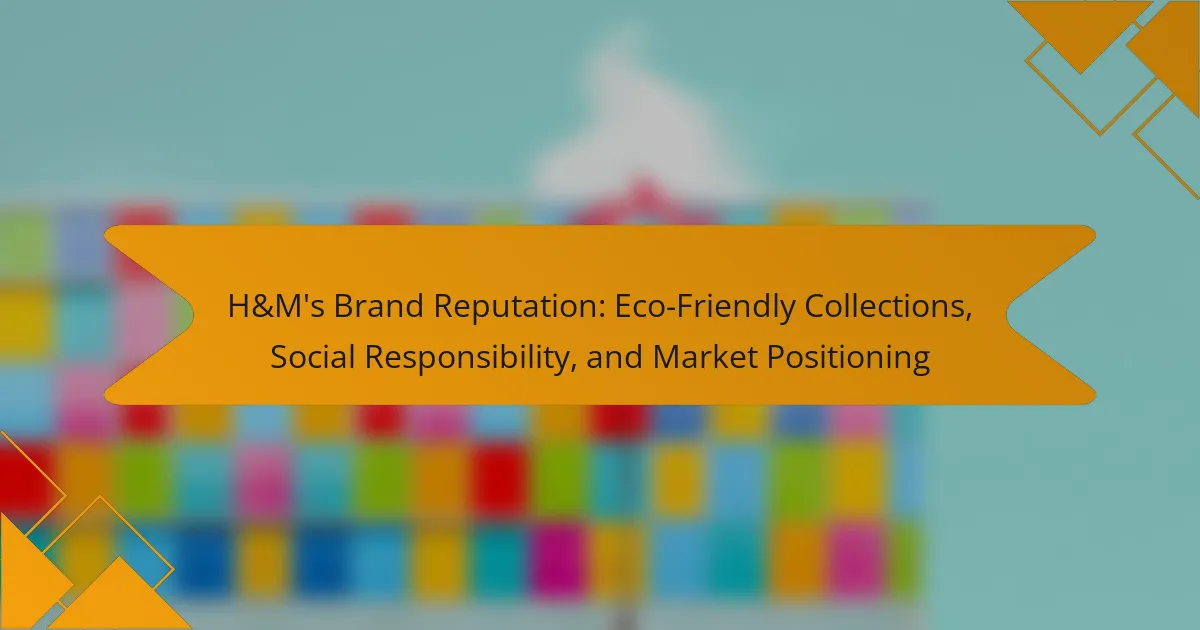Patagonia is a leading outdoor apparel brand recognized for its strong commitment to environmental activism and sustainable practices. The company promotes product durability through high-quality materials and ethical manufacturing, encouraging responsible consumption and repair over replacement. Patagonia actively supports grassroots environmental initiatives by donating a percentage of its profits and engaging in campaigns like “Don’t Buy This Jacket,” which raises awareness about the environmental impact of consumer choices. Additionally, the brand’s transparency in its supply chain and dedication to Fair Trade practices contribute to its reputation and foster customer loyalty. Overall, Patagonia exemplifies a model of ethical business practices intertwined with environmental stewardship.

What defines Patagonia’s brand reputation?
Patagonia’s brand reputation is defined by its commitment to environmental activism and sustainable practices. The company actively supports various environmental causes and donates a percentage of its profits to grassroots organizations. Patagonia emphasizes product durability, promoting long-lasting apparel to reduce waste. This focus on quality aligns with their mission to encourage responsible consumption. Additionally, the brand fosters strong customer loyalty through transparent practices and community engagement. Their “Don’t Buy This Jacket” campaign exemplifies this ethos, urging consumers to consider the environmental impact of their purchases. Overall, Patagonia’s reputation is built on its authentic dedication to environmental stewardship and ethical business practices.
How does environmental activism play a role in Patagonia’s brand identity?
Environmental activism is central to Patagonia’s brand identity. The company actively promotes sustainable practices and environmental protection. Patagonia donates 1% of sales to environmental causes. This commitment enhances its reputation among eco-conscious consumers. The brand’s campaigns often highlight climate change and conservation efforts. Patagonia’s transparency about its supply chain fosters trust with customers. The company’s initiatives, like the “Don’t Buy This Jacket” campaign, encourage responsible consumption. This approach resonates with a growing demographic prioritizing sustainability. Overall, environmental activism is integral to Patagonia’s mission and market positioning.
What specific initiatives has Patagonia undertaken for environmental sustainability?
Patagonia has implemented multiple initiatives for environmental sustainability. The company pledges 1% of sales to environmental causes through its “1% for the Planet” program. Patagonia also uses recycled materials in its products, with over 69% of its materials being sourced from recycled content. The brand promotes fair labor practices and sustainability in its supply chain. Additionally, Patagonia encourages customers to repair and recycle their gear through its Worn Wear program. The company actively engages in environmental activism, supporting grassroots organizations and campaigns. Patagonia’s commitment to sustainability is evident in its transparency about environmental impacts and goals.
How does Patagonia’s activism influence consumer perceptions?
Patagonia’s activism significantly enhances consumer perceptions of the brand. The company is well-known for its commitment to environmental sustainability and social responsibility. This activism resonates with consumers who prioritize ethical consumption. Research shows that 76% of consumers consider a brand’s environmental impact when making purchasing decisions. Patagonia’s initiatives, such as donating 1% of sales to environmental causes, reinforce its image as a leader in corporate responsibility. Consumers perceive Patagonia as trustworthy and authentic due to its transparent practices. This positive perception fosters brand loyalty among environmentally conscious shoppers. As a result, Patagonia often enjoys a competitive advantage in the outdoor apparel market.
What aspects contribute to the durability of Patagonia’s products?
Patagonia’s products are durable due to high-quality materials, advanced manufacturing techniques, and a commitment to sustainability. The company uses durable fabrics like ripstop nylon and recycled polyester. These materials withstand wear and tear over time. Patagonia also employs rigorous testing standards for its products. This ensures they can endure extreme conditions. The brand’s focus on repairability enhances longevity. Customers can easily fix items instead of discarding them. Patagonia’s dedication to environmental practices further supports product durability. The company emphasizes responsible sourcing and production methods. This approach not only benefits the environment but also reinforces the quality of the products.
What materials and technologies are used in Patagonia’s product manufacturing?
Patagonia uses a variety of sustainable materials and advanced technologies in its product manufacturing. Key materials include organic cotton, recycled polyester, and hemp. These materials reduce environmental impact and promote sustainability. Patagonia also employs Fair Trade Certified practices for labor ethics. Technologies such as water-saving dye processes and innovative insulation techniques enhance product performance. The use of bluesign® approved fabrics ensures responsible manufacturing. Patagonia’s commitment to environmental responsibility is reflected in its product lifecycle approach. This includes recycling programs and repair services to extend product longevity.
How does product durability affect customer satisfaction and loyalty?
Product durability significantly enhances customer satisfaction and loyalty. Durable products meet customer expectations for longevity and reliability. When customers perceive a product as durable, they feel it offers better value for their investment. This perception fosters trust in the brand, encouraging repeat purchases. Studies show that companies with durable products often see higher customer retention rates. For instance, a report by the Boston Consulting Group indicates that 70% of customers are willing to pay a premium for sustainable and durable goods. Thus, durability directly correlates with positive customer experiences and long-term brand allegiance.
Why is brand loyalty significant for Patagonia?
Brand loyalty is significant for Patagonia because it fosters a dedicated customer base. This loyalty enhances repeat purchases and stabilizes revenue streams. Patagonia’s commitment to environmental activism resonates with consumers, aligning their values with the brand’s mission. According to a 2021 survey by the Outdoor Industry Association, 77% of outdoor enthusiasts prefer brands that prioritize sustainability. This preference strengthens brand loyalty, as customers feel connected to Patagonia’s ethical practices. Additionally, loyal customers often become brand advocates, promoting Patagonia through word-of-mouth. This organic promotion is invaluable in a competitive marketplace. Overall, brand loyalty not only supports Patagonia’s financial success but also amplifies its environmental message.
What strategies does Patagonia employ to build and maintain brand loyalty?
Patagonia employs several strategies to build and maintain brand loyalty. These strategies include a strong commitment to environmental activism. The brand donates 1% of sales to environmental causes. Patagonia also focuses on product durability and quality. Their products are designed to last, which encourages repeat purchases. Transparency in supply chain practices builds trust with consumers. The brand actively engages with customers through social media and community events. Patagonia’s “Worn Wear” program promotes product repair and recycling. This approach fosters a loyal customer base that values sustainability.
How does customer engagement impact Patagonia’s reputation?
Customer engagement significantly enhances Patagonia’s reputation. Active participation from customers fosters a community around shared values. This connection strengthens brand loyalty and trust. Patagonia’s commitment to environmental activism resonates with engaged customers. High levels of engagement lead to positive word-of-mouth marketing. Customers who feel connected are more likely to advocate for the brand. This advocacy boosts Patagonia’s image as a responsible company. Engaged customers contribute to a strong, positive brand narrative.
How do environmental activism and product durability interconnect in Patagonia’s brand strategy?
Environmental activism and product durability are central to Patagonia’s brand strategy. Patagonia emphasizes sustainable practices in its product design. The company uses recycled materials and promotes long-lasting quality. This approach reduces waste and environmental impact. Patagonia encourages customers to repair rather than replace worn items. Their Worn Wear program exemplifies this commitment. By prioritizing durability, Patagonia aligns its brand with environmental values. This strategy fosters customer loyalty and enhances brand reputation. Studies show that consumers prefer brands supporting sustainability. Patagonia’s dual focus strengthens its market position and customer trust.
What role does community involvement play in shaping Patagonia’s reputation?
Community involvement significantly shapes Patagonia’s reputation. Patagonia engages in local initiatives and environmental activism. This commitment fosters a positive public image. The company supports grassroots organizations through funding and volunteer efforts. For example, Patagonia donates 1% of sales to environmental causes. This practice enhances customer loyalty and trust. Community involvement also aligns with Patagonia’s core values of sustainability. The brand’s active participation in social issues resonates with environmentally conscious consumers. This connection strengthens Patagonia’s reputation as a leader in corporate responsibility.

What are the key elements of Patagonia’s environmental activism?
Patagonia’s environmental activism focuses on sustainability, conservation, and social responsibility. The company actively promotes the use of recycled materials in its products. Patagonia also donates 1% of sales to environmental organizations. The brand advocates for climate change awareness through campaigns like “Don’t Buy This Jacket.” It supports grassroots environmental initiatives and encourages customers to repair rather than replace gear. Patagonia engages in activism by participating in legal actions against environmentally harmful policies. The company also emphasizes transparency in its supply chain and manufacturing processes. These elements collectively reinforce Patagonia’s commitment to environmental stewardship.
How does Patagonia educate consumers about environmental issues?
Patagonia educates consumers about environmental issues through various initiatives. The company uses its platform to share information on sustainability and conservation. It publishes articles, documentaries, and reports on environmental topics. Patagonia also engages in campaigns that raise awareness about climate change and ecological preservation. The brand emphasizes transparency in its supply chain practices. It offers resources for consumers to make informed choices about their purchases. Patagonia’s commitment to environmental activism is evident in its funding for grassroots organizations. These efforts collectively foster a culture of environmental responsibility among consumers.
What campaigns have been most effective in raising awareness?
Patagonia’s “Don’t Buy This Jacket” campaign has been highly effective in raising awareness. Launched in 2011, it encouraged consumers to reconsider consumption and environmental impact. The campaign generated significant media coverage, increasing brand visibility and discussions around sustainability. Additionally, Patagonia’s “1% for the Planet” initiative promotes environmental responsibility by donating a percentage of sales to environmental causes. This commitment has built trust and loyalty among consumers. Patagonia’s efforts have been recognized with awards, showcasing their influence in the environmental activism space.
How does Patagonia’s activism influence industry standards?
Patagonia’s activism sets new industry standards by promoting environmental responsibility and ethical practices. The company advocates for sustainable sourcing and manufacturing processes. This commitment encourages competitors to adopt similar practices. Patagonia’s campaigns often highlight climate change and conservation issues. Their initiatives, such as the “1% for the Planet” program, inspire other brands to contribute to environmental causes. As a result, Patagonia influences market expectations around sustainability. Studies show that consumers increasingly value eco-friendly brands. This shift pressures the entire industry to prioritize sustainability in their operations.
What partnerships has Patagonia formed to enhance its environmental initiatives?
Patagonia has formed several key partnerships to enhance its environmental initiatives. One significant collaboration is with the Conservation Alliance, which focuses on protecting wild places in North America. Patagonia also partners with 1% for the Planet, committing to donate 1% of sales to environmental causes. Additionally, the company collaborates with Fair Trade Certified to ensure ethical labor practices in its supply chain. Patagonia has also engaged with the Regenerative Organic Alliance to promote regenerative agriculture practices. These partnerships reflect Patagonia’s commitment to environmental sustainability and social responsibility.
How do these partnerships contribute to Patagonia’s overall mission?
Partnerships significantly enhance Patagonia’s overall mission by aligning with its commitment to environmental sustainability. These collaborations often focus on conservation efforts and ethical sourcing. For example, partnerships with environmental organizations help fund initiatives that protect natural habitats. This directly supports Patagonia’s goal of reducing its ecological footprint. Additionally, collaborations with like-minded brands promote responsible manufacturing practices. Such partnerships reinforce Patagonia’s reputation as a leader in environmental activism. By working together, these entities amplify their impact on global environmental issues. This synergy ultimately strengthens customer loyalty and trust in Patagonia’s brand values.

What makes Patagonia’s products durable and sustainable?
Patagonia’s products are durable and sustainable due to their use of high-quality materials and ethical manufacturing practices. The company employs recycled fabrics, such as recycled polyester and organic cotton, which reduce environmental impact. Additionally, Patagonia designs products for longevity, encouraging consumers to buy less and repair items instead of replacing them. The brand also adheres to Fair Trade practices, ensuring fair wages and safe working conditions for workers. Their commitment to environmental initiatives is demonstrated through programs like Worn Wear, promoting the repair and resale of used gear. These practices contribute to Patagonia’s reputation as a leader in sustainable outdoor apparel.
What are the benefits of using recycled materials in product design?
Using recycled materials in product design reduces environmental impact and conserves resources. This practice minimizes waste and lowers energy consumption during production. For example, recycling one ton of plastic can save up to 7,200 kilowatts of energy. Additionally, it helps decrease greenhouse gas emissions. Companies like Patagonia utilize recycled materials to enhance their sustainability efforts. This commitment attracts eco-conscious consumers and strengthens brand loyalty. Research shows that 66% of consumers are willing to pay more for sustainable brands. Thus, using recycled materials aligns with both environmental goals and consumer preferences.
How does Patagonia ensure the longevity of its products?
Patagonia ensures the longevity of its products through high-quality materials and robust construction techniques. The brand uses durable fabrics, such as recycled polyester and organic cotton. These materials withstand wear and tear over time. Patagonia also implements rigorous testing standards for performance and durability. The company offers repair services to extend product life. This commitment to repairability encourages customers to maintain their gear. Additionally, Patagonia promotes a culture of responsible consumption. They encourage customers to buy less and choose quality over quantity.
What certifications or standards do Patagonia products meet for sustainability?
Patagonia products meet several certifications and standards for sustainability. These include the Global Organic Textile Standard (GOTS), which ensures organic fiber content and environmentally friendly production processes. They are also certified by the Fair Trade Certified program, promoting fair labor practices. Additionally, Patagonia is a member of the Responsible Wool Standard (RWS), which ensures animal welfare and sustainable land management. Their products are made with recycled materials, verified by the Global Recycled Standard (GRS). Patagonia’s commitment to sustainability is further demonstrated by their adherence to the bluesign® system, which focuses on resource productivity and consumer safety.
How do these certifications impact consumer trust?
Certifications enhance consumer trust by providing verified evidence of a brand’s commitment to quality and ethics. For example, Patagonia’s certifications in environmental sustainability assure consumers that their products meet rigorous standards. This transparency fosters confidence in the brand’s practices. Research indicates that 88% of consumers are more likely to trust brands with recognized certifications. Additionally, certifications can differentiate a brand in a competitive market, reinforcing consumer loyalty. Trust built through certifications often leads to repeat purchases and positive word-of-mouth.
What practical tips can consumers follow to support sustainable brands like Patagonia?
Consumers can support sustainable brands like Patagonia by making informed purchasing decisions. They should prioritize products made from recycled or organic materials. Research indicates that Patagonia uses 100% recycled nylon in many products. Choosing high-quality items that last longer reduces waste. Consumers can also participate in brand take-back or recycling programs. Patagonia offers a Worn Wear program for used gear. Supporting companies with transparent supply chains is essential. Brands like Patagonia disclose their sourcing practices. Lastly, consumers can advocate for environmental policies that align with sustainable practices. Engaging in community efforts strengthens the impact of sustainable brands.
Patagonia is the primary entity discussed in the article, recognized for its strong brand reputation rooted in environmental activism, product durability, and brand loyalty. The article outlines Patagonia’s commitment to sustainable practices, including donating a percentage of sales to environmental causes and using recycled materials in product manufacturing. It highlights the importance of product durability in fostering customer satisfaction and loyalty, as well as the role of community engagement in enhancing the brand’s image. Additionally, the article examines Patagonia’s various initiatives, partnerships, and campaigns that reinforce its position as a leader in corporate responsibility and ethical consumption.


